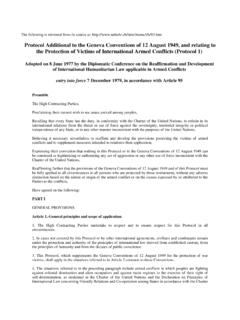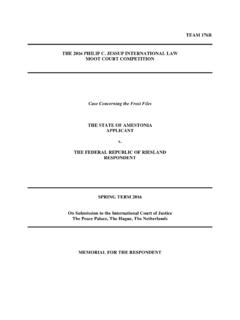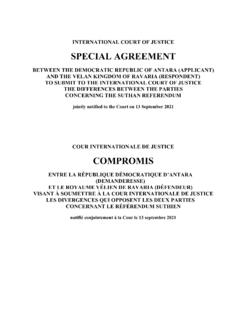Transcription of A Guide to the Philip C. Jessup International Law Moot ...
1 A Guide to the Philip C. Jessup International Law Moot Court Competition Published by: Sponsor: . Contributing Authors Michael Y. Liu ( ) won the China Jessup Championship and Best Oralist award in 2007 and 2008, on behalf of Renmin University and has been coaching and judging the Jessup Moot since then. He is now a Civil Party Lawyer at the Extraordinary Chambers in the Court of Cambodia (ECCC), adjunct professor at the Royal University of Law and Economics (Cambodia) and the Secretary-General of CIICJ. (Email: Vinca Yau ( ) co-authored the Hardy C. Dillard Best Memorial in 2010 and the Best Memorial at the Lawasia International Commercial Arbitration in 2011. Representing the Chinese University of Hong Kong, she won the Hong Kong Regional Round in 2010 and 2012, and was awarded the Best Oralist in 2012. She is currently a LLM student at the University of Cambridge and is the Co-Director of CIICJ's Hong Kong Chapter.)
2 (Email: Liu Xiao ( ) won the China Jessup Championship and the Best Oralist Award in 2006, on behalf of Peking University. Subsequently, he coached the Peking University Jessup Team in 2011. He is now an Associate at Skadden, Arps, Slate, Meagher & Flom LLP (Beijing Office). Zachery Lampell won the Jessup World Championship in 2008, while a student at Case Western Reserve University School of Law. He is currently the Deputy Director of the English Language Based Bachelor of Law Program at the Royal University in Phnom Penh, Cambodia, coach of the Cambodian Jessup team, and regularly consults with governmental and non-governmental organizations on human rights and International legal issues. The views set forth herein are his personal views and do not necessarily reflect those of the university with which he is associated. Advisors Nina H. B. J rgensen is a Professor in the Faculty of Law at the Chinese University of Hong Kong and a Visiting Fellow on the Human Rights Program at Harvard Law School (2014-15).)
3 She is a qualified barrister and previously worked for eight years in different capacities (prosecution, judges' chambers, and defence) at the Special Court for Sierra Leone in Freetown and The Hague, the Extraordinary Chambers in the Courts of Cambodia in Phnom Penh, and the International Criminal Tribunals for the Former Yugoslavia and Rwanda in The Hague and Arusha respectively. Michael Ramsden is an Associate Professor in the Faculty of Law at the Chinese University of Hong Kong, Director of the Centre for Rights and Justice, and a Barrister of Lincoln's Inn. Over the years he has coached many championship and award-winning teams in International mooting competitions. Roger Phillips works as a Legal Officer in the Trial Chamber of the Extraordinary Chambers in the Court of Cambodia (ECCC). Prior to that he worked for the International Criminal Tribunal for Rwanda. He is an advisor to CIICJ and the creator of communis hostis omnium, a law blog devoted to issues of maritime piracy.
4 Joe Tan is a practising International human rights lawyer with the Human Dignity Trust based in London. He was formerly a Legal Advisor in the Pre-Trial and Trial Chambers of the Special Tribunal for Lebanon (STL) and the Office of the Prosecutor at the International Criminal Court (ICC). He has also been a Legal Advisor with the United Nations Interim Administration Mission in Kosovo (UNMIK) after the Kosovo War specializing in the protection of ethnic and other minorities in transitional post-conflict settings. Prior to this, he practiced as a defence lawyer for indigent clients for a number of years in Australia where he is a qualified barrister and solicitor. He is an advisor to CIICJ. His views and advice are provided purely in a personal capacity and do not represent the position of any other organization. Margaux J. Day provided advice on Chapter 3 of this Guide . She is the Asia-Pacific Director of Ethics and Compliance at Diebold, Inc.
5 And resides in Shanghai, China. In 2008, her team won the Jessup World Championship, and she was named Top Oralist in the Final Round. Her views set forth in Chapter 3 are her personal views and do not necessarily reflect those of the company with which she is associated. Layout Editors The Hong Kong Student Law Gazette is a Hong Kong law student publication. It is published twice each academic year reaching out to Hong Kong law students, primarily through campus-wide distribution and the annual Hong Kong Law Fair. The Gazette aims to showcase the opinions of Hong Kong's law students, contribute to legal scholarship and foster dialogue between law students and the legal community. Christina Ling is a LLB candidate at the Chinese University of Hong Kong and a legal intern with CIICJ. Disclaimer None of the parties involved in the publication of this Guide represent the International Law Students Association or the China National Round Administrator of the Jessup Moot.
6 Though the status of the law, if mentioned in any part of this Manual, is stated to the best of the co-authors' knowledge as of the date of publication, they are the mere opinion of the co-authors and should not be relied upon by readers without having had conducted their own research. Publisher's Note This Guide has been updated as of 25 October 2014. It was initially distributed to participants of the Jessup China Regional Rounds in February 2014, and has since been revised and updated for an International audience. Table of Contents Introduction 1. Chapter One: Written Advocacy 2. I. Warming up before the competition begins 3. II. Gathering your research materials 5. III. Spotting the right issues 9. IV. How to make a reasonable and reasoned legal argument 13. V. Drafting a good memorial: simplicity without simplification 19. Chapter Two: Oral Advocacy 23. I. Preparing for oral arguments 24.
7 II. An advocate's demeanour 26. III. Structuring your oral submissions 29. IV. Responding to your opponents' arguments 33. V. Answering the judges' questions 37. VI. Time management is key 43. Chapter Three: Competition Strategy 45. I. Team selection 46. II. Coaching responsibilities and tips 49. III. A Journey through the Jessup moot 51. Conclusion 54. Preface This Guide is drafted with an International audience in mind. Though some of the input derives from our experience from CIICJ's China Jessup Training Tour (December 2013), our personal experiences having competed in other jurisdictions and the International Round, also inform this Guide . It is said that the Jessup Moot is addictive, we cannot help but concur! Yet, in all seriousness, the benefits do outweigh the detriments. A love for International law, you would develop. Lifelong friendships, you would forge. Sharper legal instincts, you would hone.
8 At the end of the day, mooting is meant to be a fun and intriguing learning experience. This Guide is a revision of the 55 things you should know about the Philip C. Jessup International Law Moot Court Competition' which we published last year. Much of the emphasis was placed on Oral Advocacy. Yet, we are acutely aware that an oralist is only as good as the quality and depth of his/her research. Hence, we decided to expand the booklet into this 3-Chapter Guide , covering: Chapter 1: Legal Research and Memorial Drafting;. Chapter 2: Oral Advocacy; and Chapter 3: Competition Strategy. For participants from China, we have a special word of encouragement for you. In the past decade, much has been written on China's role in this century. As legal practitioners to be, you might ask yourselves how China can safeguard her interests abroad and how that necessarily entails reforms at home. We hope that the Jessup Moot would encourage you to think about the challenges and opportunities that China would be presented with in this new age.
9 Last but not least, we would like to thank all our advisors for their time and effort in reviewing this Guide ; Suzy Su for her editorial support, Kat Tai Tam for his advice and all our colleagues at CIICJ, in particular Yuqing Liu, for their kind assistance;. and all who have lent us their support in one way or another in making this publication possible. If you have any questions or suggestions, please feel free to contact us at Michael Y. Liu Vinca Yau Xiao Liu Zach Lampell February 2014. Introduction Appreciating the relationship between you and the bench You assist. The Bench decides Judges are the ones to decide who wins the case in the real world or how good you are in the Moot Court. The relationship between you and the judge is not one of equality but one of subservience' or deference and respect'. You are there to assist the court rather than teach or debate with them. This is best manifested in the oral submissions, though it is equally applicable to memorial drafting.
10 If the judges adamantly do not buy your argument after several attempts, there is no need to try and coax them into it any further. Just move on to your alternative submissions. Or if the judges want to hear your subsequent arguments first and flip your entire order of presentation around, just follow their approach. It is their concerns that you are trying to address here not yours. If they ask you questions before you even begin your submissions, answer their questions first with the matter from your submissions. Refrain from teaching the law It is fairly common for advocates to start lecturing the judges on International law in both their memorials and oral submissions. The trick is in correctly understanding your relationship with the judge: you are there to assist them, not tell them what to do. So when you are trying to inform the judges, either in your memorial or oral submissions of something they seem to not know about, make it sound as if, you are helping them recall some long lost memory, matters they once knew but just forgotten over time.











